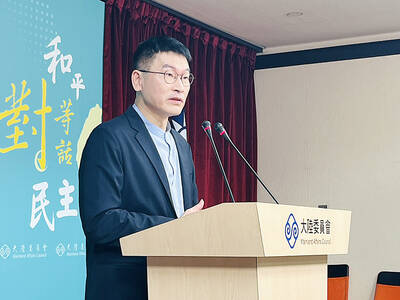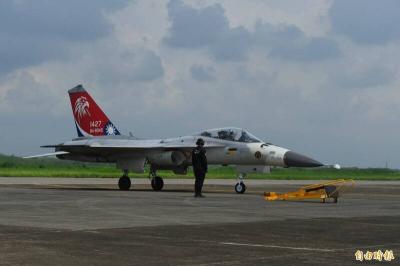In the gentle morning light, 22-year-old Liu Chun-lin brushes her 2cm eyelashes, fastens her flowing raven hair, and sets off for another day of crying her heart out for someone else's dead relatives.
Liu and her five-member "Filial Daughters Band" are part of a thriving funeral mourning business, professional entertainers paid by grieving families to wail, scream and create the kind of anguished sorrow befitting a proper funeral.
Complex, lavish and drawn-out, the performances are as much a status symbol for the living as a show of respect for the dead.
Taiwanese death rites regularly feature processions of elaborate floats displaying folklore figures in vividly colorful costumes, bands of drummers and trumpet players and even strippers and scantily clad singing women.
Even a scaled down event -- something without processions and floats -- can cost families in excess of NT$200,000 (US$6,000), mortuary operators say.
Grieving relatives are often too weary or too numb to shed the requisite amount of tears, so rather than leave a void, they hire groups like the "Filial Daughters Band" to perform their mournful stuff.
On a recent weekday morning, Liu and the group arrived at a municipal funeral home in the rural outskirts of Taipei for a typical exercise in empathy.
Mounting an outdoor stage, Liu danced, posed, and clicked bamboo sticks to the tune of a well-known mourning song, before launching into her signature high-pitched, heart-wrenching wailing while pounding the floor and crawling on her knees to express grief for a dead stranger.
After finishing the song, she shed her rainbow-colored costume in favor of the white satin mourning dress with matching white linen head cloth required for the main ritual.
With brother Liu Wen-chi on an electronic piano, she returned to the stage, recalling the harsh life of the dearly departed, a woman who had sacrificed everything to raise her dutiful children.
"Mama," she chanted into a hand-held microphone. "From now on we go our separate ways. We look around everywhere but see no traces of you."
The woman's two adult sons and daughter quickly took up the beat and let their tears flow freely.
But it was Liu who set the pace, Liu whose emotion was greatest.
For 40 minutes she chanted, danced and wailed, touching the hearts of the audience.
Back in the band's van, Liu changed into a pink shirt and jeans, and considered the challenge of playing necrologic cheerleader for total strangers.
"I just imagine that I am part of the family and I fuse myself into the occasion," she said.
As tradition clashes with modernity, some Taiwanese young people -- particularly in big cities -- are reconsidering the need for expensive, elaborate funerals, opting for simpler, more restrained rites instead.
Touting the virtues of using the Internet to post pictures of dead relatives and dispense with or shorten formal rites, authorities are pressing grieving families to drop ceremonies considered too lavish or superstitious.
But old customs die hard for the many Taiwanese, who still insist on traditional procedures, including hiring monks and nuns to chant Buddhist scriptures to help spirits seeking the path to reincarnation.

LOW RISK: Most nations do not extradite people accused of political crimes, and the UN says extradition can only happen if the act is a crime in both countries, an official said China yesterday issued wanted notices for two Taiwanese influencers, accusing them of committing “separatist acts” by criticizing Beijing, amid broadening concerns over China’s state-directed transnational repression. The Quanzhou Public Security Bureau in a notice posted online said police are offering a reward of up to 25,000 yuan (US$3,523) for information that could contribute to the investigation or apprehension of pro-Taiwanese independence YouTuber Wen Tzu-yu (溫子渝),who is known as Pa Chiung (八炯) online, and rapper Chen Po-yuan (陳柏源). Wen and Chen are suspected of spreading content that supported secession from China, slandered Chinese policies that benefit Taiwanese and discrimination against Chinese spouses of

PROMOTION: Travelers who want a free stopover must book their flights with designated travel agents, such as Lion Travel, Holiday Tours, Cola Tour and Life Tours Air Canada yesterday said it is offering Taiwanese travelers who are headed to North America free stopovers if they transit though airports in Japan and South Korea. The promotion was launched in response to a potential rise in demand for flights to North America in June and July next year, when the US, Canada and Mexico are scheduled to jointly host the FIFA World Cup, Air Canada said. Air Canada offers services to 13 of the 16 host cities of the tournament’s soccer games, including Toronto and Vancouver; Mexico City, Guadalajara and Monterrey in Mexico; Atlanta, Georgia; Boston; Dallas; Houston;

The US approved the possible sale to Taiwan of fighter jet spare and repair parts for US$330 million, the Pentagon said late yesterday, marking the first such potential transaction since US President Donald Trump took office in January. "The proposed sale will improve the recipient's capability to meet current and future threats by maintaining the operational readiness of the recipient's fleet of F-16, C-130," and other aircraft, the Pentagon said in a statement. Trump previously said that Chinese President Xi Jinping (習近平) has told him he would not invade Taiwan while the Republican leader is in office. The announcement of the possible arms

ALIGNED THINKING: Taiwan and Japan have a mutual interest in trade, culture and engineering, and can work together for stability, Cho Jung-tai said Taiwan and Japan are two like-minded countries willing to work together to form a “safety barrier” in the Indo-Pacific region, Premier Cho Jung-tai (卓榮泰) yesterday said at the opening ceremony of the 35th Taiwan-Japan Modern Engineering and Technology Symposium in Taipei. Taiwan and Japan are close geographically and closer emotionally, he added. Citing the overflowing of a barrier lake in the Mataian River (馬太鞍溪) in September, Cho said the submersible water level sensors given by Japan during the disaster helped Taiwan monitor the lake’s water levels more accurately. Japan also provided a lot of vaccines early in the outbreak of the COVID-19 pandemic,